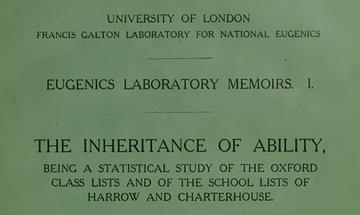Workshop: Eugenics in the Academy
As you can see from the links above, there are various registration options. Via the first link, you may register to attend the entire workshop. Doing so will also reserve you a spot in the keynote lecture (no need to register separately). Alternatively, you can sign up to attend the keynote only, either in-person (second link) or online (third link). In-person capacity at both the workshop and the keynote lecture are limited, so register soon to reserve your place!
Programme

E.H. Schuster and E.M. Elderton, The Inheritance of Ability: Being a Statistical Study of the Oxford Class Lists and of the School Lists of Harrow and Charterhouse (London: Dulau and Co., 1907)
Organiser
In summer 2020, memorials to prominent eugenicists Francis Galton, Karl Pearson, and Ronald Fisher were removed from campuses in London and Cambridge, as campaigners pressured universities to address their historical entanglements with the eugenics movement. Eugenics is the project of improving the genetic ‘quality’ of human populations by controlling who is and is not able to reproduce. Today, it is widely derided as dangerous ‘pseudoscience’. But this was not always so. In Britain, the birthplace of the movement, eugenics once boasted the status and infrastructure of a bona fide science, with lavishly funded university departments and laboratories, dedicated learned societies, and specialist scholarly journals. This workshop will reckon with these histories. Through case-studies ranging from UCL's Galton Laboratory for National Eugenics, to Oxford's short-lived (and little-studied) Anthropometric Laboratory, contributions will ask how elite institutions of teaching and research have historically helped to establish and sustain eugenics. We will also be concerned with the afterlives of eugenics in the academy. How were eugenic academic networks and infrastructure dismantled or otherwise transformed following the Second World War, when the movement’s popularity and visibility waned? Some institutions have already begun the urgent work of confronting their historical entanglements with eugenics – eg, through curricular reform, commissioned research, exhibitions and outreach activities, as well as through processes of renaming and denaming. This workshop will provide an opportunity to reflect critically upon these initiatives, and to consider how institutions might do better going forward.
17:00-18:00 Keynote Lecture (History Faculty Lecture Theatre & Online)
Subhadra Das (Independent Scholar), ‘It Takes a University: Towards Critical Eugenics in the Academy’
It was during one of the last meetings of the Commission of Inquiry into the History and Legacy of Eugenics at UCL when one of my fellow committee members turned to me and said, "If you think UCL is so bad, why don't you go and work somewhere else?". This is a question many non-white people who work in universities have heard before and it is an emotional reminder of something we intellectually know to be true: the definition of institutional racism is when the normal functioning of an institution reproduces racist outcomes. In this talk, I will look to my own and to my colleagues' experiences of telling critical stories about the history of eugenics at University College London with the theme of institutional racism in mind. What does it mean to belong to an institution? Whose voices are amplified, and whose are summarily dismissed? Who gets promoted, and who is told they might do better elsewhere? And in the light of this history, whose responsibility is it to confront and combat systemic injustice?

Subhadra Das is a writer and historian who looks at the relationship between science and society, and what those histories mean for our lives today. For nine years, she was Curator of the Science Collections at University College London, where she was also Researcher in Critical Eugenics at the Sarah Parker Remond Centre for the Study of Racism and Racialisation. Her research centres around critical approaches to the history of science, particularly race science and eugenics, along with the history of museums, particularly the colonial history of natural history museums. Subhadra is an experienced history of science communicator, and she specialises in making difficult and contentious subjects engaging to public audiences. She has written and presented podcasts, curated museum exhibitions, done stand-up comedy and regularly appears on radio and TV. Her first book Uncivilised: Ten Lies That Made The West is out now.


